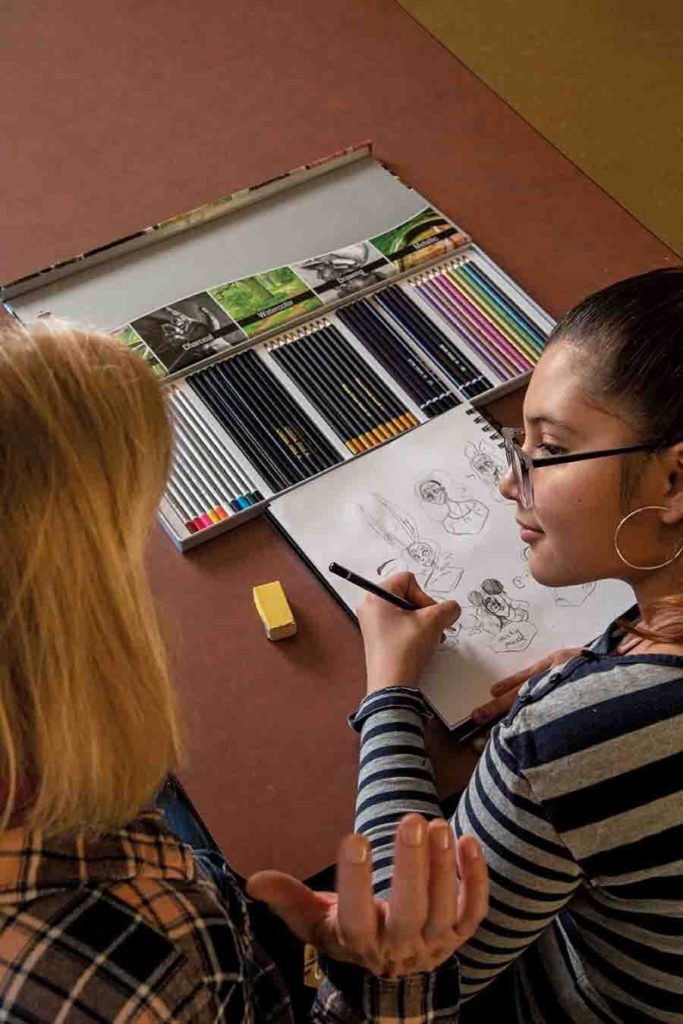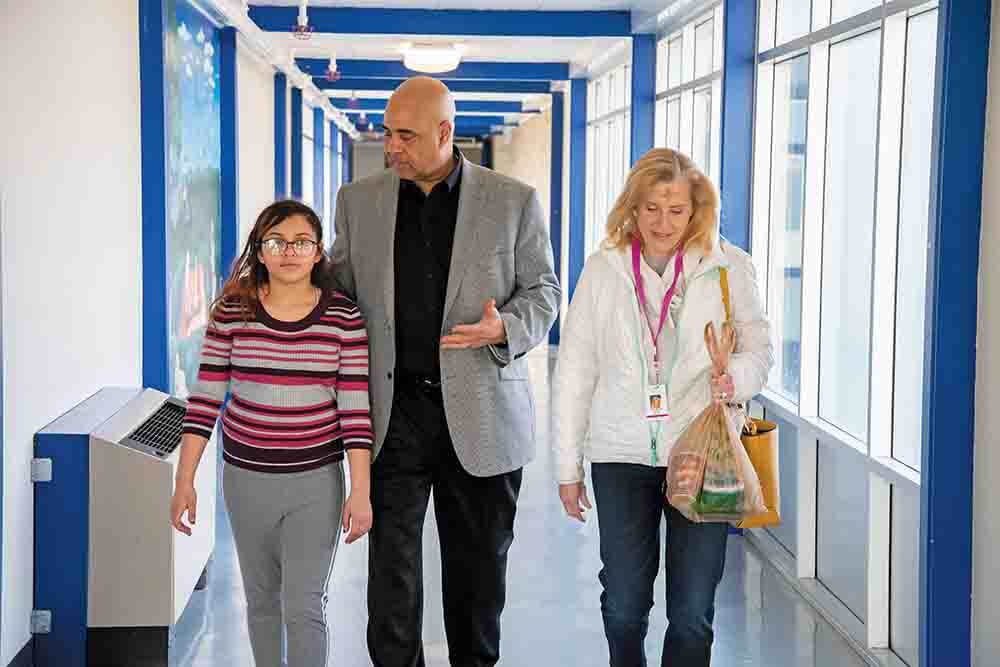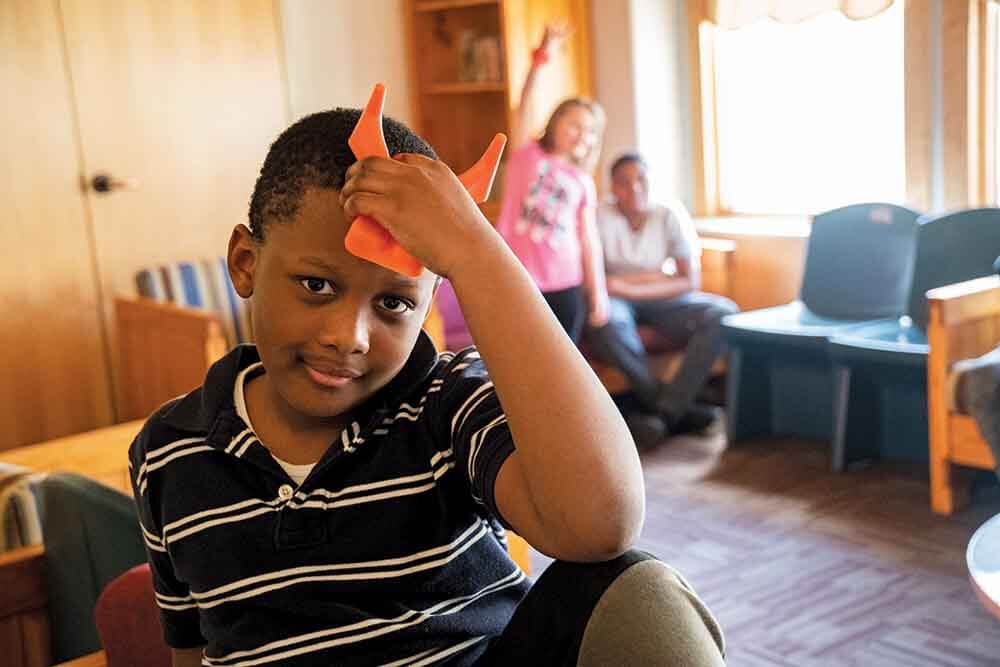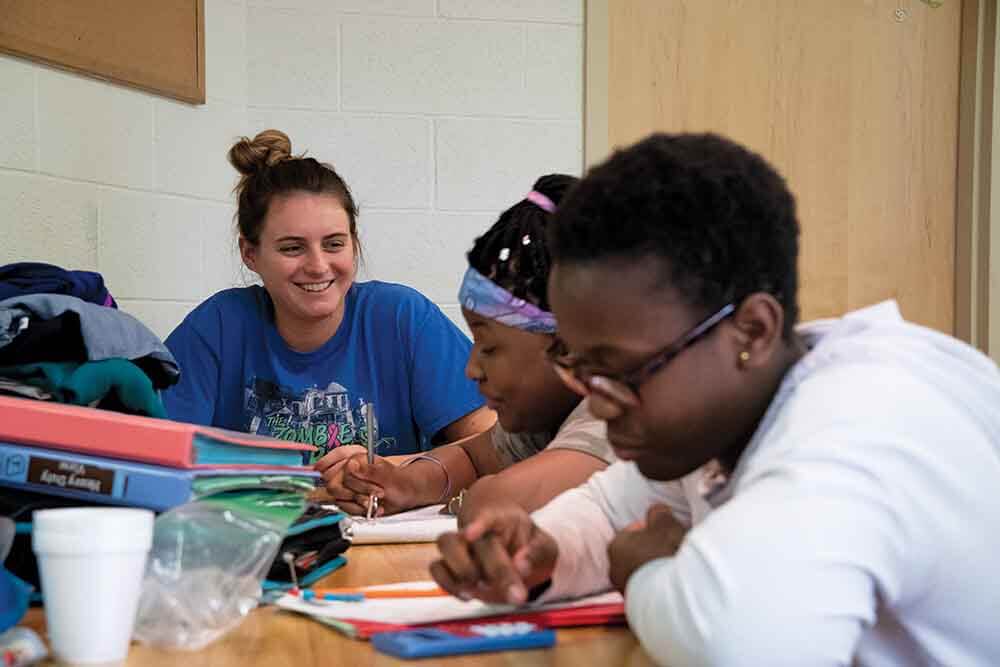Fourth in a Series
The October 2017 issue of the Catholic Review explored the theme of “Positively Catholic” through Education, Health Care, Parish Life and Service. Each Review print issue in 2019 will explore one of those aspects of being “Positively Catholic.”


TIMONIUM – Black-and-white photos from the mid-20th century of religious women caring for children decorate some of the halls of St. Vincent’s Villa.
They serve as a reminder of the roots of a mission that predates the Civil War, when the Catholic Church opened several orphanages, including one at St. Vincent de Paul Parish in Baltimore.
In one girls’ wing of St. Vincent’s Villa, however, most bedroom doors are adorned with the artwork of Emily, evoking characters from Japanese anime.
“It’s amazing how they draw,” Emily said of the professionals who inspire her.
On one door, her sketch included the reminder, “You are beautiful the way you are.”
Some of the girls in the wing have asked Emily to teach them how to draw.
“That makes me feel good,” she said. “I get to show my creativity, and keep getting better at what I can do in the future. If they want to learn, I can show them.”
Emily, 12, speaks volumes about the care being given at St. Vincent’s Villa, a Catholic Charities of Baltimore residential treatment program for children 5-14.
According to its mission statement, St. Vincent’s Villa serves children whose “behavioral and emotional needs have not responded to community-based interventions and services.”
Treating trauma
What happens when typical childhood challenges are compounded by an environment that includes abuse, addiction, homelessness, malnutrition and/or violence?
“The topic of ‘adverse childhood experiences’ is a huge area of discussion in the world of pediatrics,” said Dr. Jonathan Clemens, a pediatrician who practices at Mercy Medical Center in Baltimore. “Certain illnesses can result from deprivations early in life.”
He mentioned anxiety, depression and heart disease, and shared anecdotes of two young children recently brought to his office, both by their grandmothers.
One had witnessed her mother stab and kill her father. The other had suffered a ruptured spleen as a result of physical abuse.
Where does a child suffering from such severa trauma get help?
If it takes a village to raise a child, those who come to St. Vincent’s Villa – where capacity is 80 – receive attention from an array of physicians, nurses, psychiatrists, social workers and professional counselors.
Care is round-the-clock, and not just from the overnight staff. Ann Pullen, a senior residential treatment counselor, spends the night when her 6:30 a.m.-2:30 p.m. shift follows one of 2-10 p.m.
Pullen came to Catholic Charities straight from Coppin State University, where she earned a degree in special education for the mildly handicapped.
That was in 1986, when Ray Wright already had five years under his belt helping troubled children on the rambling Catholic campus in Baltimore County that ranges from Villa Maria School, for children with emotional disabilities, to the hospice unit at Stella Maris.
Things have changed

The director of Residential and Behavioral Services at St. Vincent’s Villa, Wright was raised at St. Ambrose in Park Heights, and is a parishioner of New All Saints in Liberty Heights.
“The majority of the people here are called to do this, they’re surely not doing it because of the money,” Wright said of the staff. “They have a belief, to help those who are less fortunate than yourself and make mankind better as a result of that.”
Pullen and her sisters comprise the Tyler Sisters, a gospel group. For the last decade, Wright’s commitment to youths included being the head football coach at Randallstown High School.
Before he earned degrees at Morgan State University and the University of Maryland Baltimore, Wright went to Milford Mill High School. From then to now, his frame of reference has expanded to accommodate an explosion of social ills.
“When I was in high school, for somebody to wield a knife was huge,” Wright said. “Now we’re dealing with handgun violence, and an opioid epidemic that didn’t exist 20 years ago. We’ve got children being physically and sexually abused, … kids who are born with fetal alcohol syndrome.”
Don’t get Wright started on cell phones.
“That can disconnect them from their family and humanity,” said Wright, describing how cell phones can accelerate children becoming victims of sex trafficking. “Whether it’s physical or sexual abuse, that stunts the emotional growth of a child, as well as brain development itself.”
Unseen wounds often manifest themselves in very public cries for help.
“They act out because they haven’t been given what the rest of us were given,” Wright said of some of the children who come to St. Vincent’s Villa. “A baby cries because it needs to be fed or have its diaper changed. If a parent doesn’t respond, as a child grows, they don’t develop trust and relationships.
“Where you and I would have somebody to talk to, a fight or flight response might develop, because the person that they were talking to was abusing them.”
Respect

Wright said that the children at St. Vincent’s Villa “must know that at least one person takes an interest” in them. He pointed to “a kid named Lamont” from early in his career. The 8-year-old, seemingly catatonic, was one “who wouldn’t even open his mouth.”
“When he did say hi, it was with his behavior,” Wright said. “He fought, broke stuff, destroyed property. Everyone thought that kid would never make it, that he would kill somebody, or himself.”
Wright “stuck with” Lamont, who eventually moved on to a group home. Wright attended his high school graduation, and said, “Now he’s got a job, a wife and two kids.”
In that era, children spent as long as five years in the care of Catholic Charities. Now, stays at St. Vincent’s Villa are limited to one year, which, Wright said, means “we intensify our services.”
That includes modeling good behavior and habits not just for children, but for their parents or primary caregivers.
Wright remembers St. Vincent’s Villa having to change “the hierarchy of a girl and a mother who were more like sisters than mother and daughter. We had to teach her to learn how to respect a mom, and we had to give the mom mothering skills.”
Children come to St. Vincent’s Villa, an official provider for Maryland’s Department of Human Services and Behavioral Administration, from every corner of the state. When possible, they spend weekends at home. Some attend nearby Villa Maria School, another Catholic Charities facility; others are mainstreamed in local public schools.
At St. Vincent’s Villa, they are diagnosed and provided counseling, recreational outlets, structure, wholesome food, medication, and, when appropriate, a hug.
Connections

Additional support comes from volunteer mentors, such as Kate Flowers.
A certified registered nurse practitioner, Flowers is a parishioner of Church of the Nativity in Timonium. Her education began at St. Pius X School in Rodgers Forge, and then the Institute of Notre Dame.
Her Christmas giving in 2017 included St. Vincent’s Villa and in short order she was training to serve in its Therapeutic Mentoring Program, which pairs volunteers with children to build a “trusting relationship.”
Those volunteers serve not just at St. Vincent’s Villa, according to Lauren Porter, the mentor program coordinator, but at Villa Maria Outpatient Mental Health Clinics in Baltimore City, as well as Anne Arundel, Baltimore, Carroll and Harford counties.
Flowers is the mother of a 12-year-old girl, the same age as Emily, the artist who came to St. Vincent’s Villa from an unstable home environment. Since last spring Flowers has been building a relationship with Emily, whose future plans include a move to a town in the Midwest.
“She’s a talented person,” Flowers said of Emily.
“All kids are looking for the same thing: they want security and love,” Flowers said. “We all want to be accepted.”
What, if anything, has Flowers gained from being a mentor?
“It’s been a learning experience, opened my eyes to a better understanding of what can happen to a life,” Flowers said. “As a nurse and a mom, you want to heal and fix. That’s not necessarily going to happen (as a mentor). The best thing you can offer is stability.”
To learn more about the Therapeutic Mentoring Program and other volunteer opportunities, email Lauren Porter at lporter@cc-md.org

